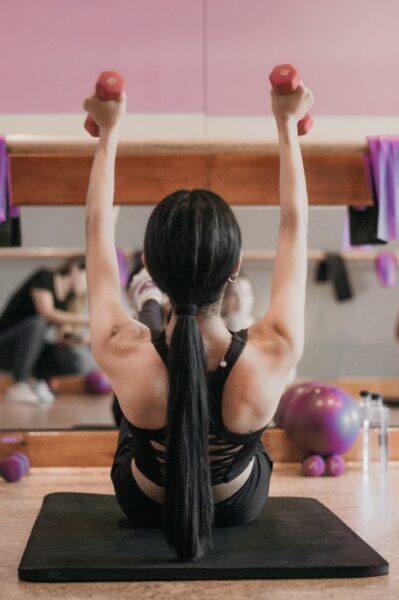
The Menopause: Reframed
The Menopause: Reframed
With World Menopause Day on 18 October, we look at how to embrace this next stage of life…
Much has changed in recent years in how the menopause is viewed. It is no longer the taboo subject it once was – and yet the stereotypes remain, and its sometimes debilitating symptoms are not treated as seriously as they should be.
But when you’re in the midst of some distressing symptoms it can be hard to move forward. It has been said that there are 34 common signs of menopause – it is likely there are many more. Away from the more well-known such as hot flushes, brain fog and night sweats, other symptoms can include tingling extremities, bloating, dizziness and an irregular heartbeat. As they can be related to other health problems, it is worth seeing a medical professional first. This is a good time to check in on your overall health, while looking at the options available to you for menopause-related problems.
GP and life coach, Laura Wood, has been helping women for most of her career through the menopause. “I have heard of so many symptoms from women, aside from the hot flushes and night sweats. Memory loss is very common, physical aches and pains, dry skin, a change in hair texture, tiredness, low libido, a burning mouth, even the sensation that things are crawling on the skin, taste changes and tinnitus. The list is endless.”
Adds Laura: “I have had women come to me thinking that they are going mad and are on the verge of resigning from their jobs, because of memory problems. It can lead to huge panic and crisis of confidence. But they are still just as capable, they just need help with their symptoms.” Plus, there are the visible changes to appearance to deal with. Hair loss is particularly upsetting. Hair expert Gina Conway says that if you catch hair loss early, you can prevent losing more. Scalp treatments and products containing zinc, biotin and caffeine can help to expand blood supply to your hair, reducing the amount of hair shed and helping to keep the hair on your head healthy and full.
Larissa Christian, Specialist Women’s Health Physio at Six Physio Fitzrovia, says it is important not to suffer in silence. “Consult a healthcare professional if there are any symptoms that you are struggling to control.” Diet, exercise and sleep are key parts of the toolkit in helping to manage symptoms, she says, including having a balanced diet rich in fruit, vegetables, whole grains and lean proteins. Incorporate foods with calcium and vitamin D and limit processed foods, caffeine and alcohol. Aim to incorporate regular physical activity at a level that is safe for you, and maintain a good sleep schedule.

Nesse Cannon is the founder and CEO of BarreFly London, a boutique fitness studio and women’s wellness centre in Parson’s Green. As a three-time cancer survivor whose body threw her into menopause at the age of just 37, Nesse has focused on how best to confront women’s life changes from a nutritional and physiological standpoint.
Her advice: “Firstly, increase protein. As we age, our protein requirements double from when we are in our early 20s. Just ensure that these are from plant-based sources, so that we’re not also increasing our cholesterol levels.”
Incorporate strength training as well as focusing on balance and stability exercises, she says. “Our muscles will begin to atrophy which means it takes even more effort to keep the muscle we have, never mind any muscle we may want to add. Muscles, of course, provide support for the skeletal system, and those stabilising muscles around the knees, hips and shoulders become increasingly important with age.”

“Invest in a good sleep vitamin. Menopause wreaks havoc with sleep patterns (as anyone who has had night sweats can attest to), but there are some terrific sleep vitamins on the market (I love Lumity’s Wellrested), which help regulate temperature, hormones and vitamin levels, allowing you to relax and stay sleeping for longer.”
Says naturopathic nutrition specialist Jessica Shand: “An important food group not to overlook is phytoestrogens. Otherwise known as plant oestrogens, they act as weak oestrogens in the body and can help compensate for the declining levels experienced during menopause. Phytoestrogens include soybeans, peanuts, flax seeds, barley, grapes, berries, plums, green and black tea and many more.” It’s also essential to look after your gut health.
Ultimately, it is about making your own wellbeing a high priority. Kate Rowe-Ham launched the Owning Your Menopause app, having struggled to find support while battling with her own symptoms of menopause. The app has workout sessions, advice on diet advice and you can chat to others going through the menopause. She says: “Midlife is a time when we may find ourselves juggling family life, home life, work life, elderly, or sick parents, and many of our needs fall by the wayside. This often coincides with some of the menopause symptoms that can make life seem that extra bit harder, and, feeling lost, we may put our own health on the back burner. Empowering yourself with information is key when it comes to the menopause. Learning to listen to your body becomes fundamental. If we understand the changes and learn how we have the power if we create a toolbox using diet and exercise we can transform this time into a truly positive experience.”
Positive Changes

Gina Broadhurst
Georgina Broadhurst has found a new lease of life raising money for charity and taking part in Ms Great Britain, having struggled with debilitating symptoms of perimenopause. “As all of these symptoms started in my early 40s I wasn’t really being taken seriously. I was left feeling mentally and physically exhausted and completely not myself. I was repeatedly incorrectly told that HRT was not an option due to a blood condition I have. But I kept pushing and now have an HRT prescription and a proper care plan in place with my GP. I know that HRT is not the answer for everyone. What is important in all of this is knowledge. There are 13 million women going through the menopause right now in the UK so if it isn’t currently affecting you, or a family member, or a work colleague, or friend I would be surprised. We all need to know more, do more, understand more, when it comes to menopause. Listen to your instincts and if you feel you are being fobbed off then seek a second opinion.”
“It is really important to remember that menopause is not a dirty word, don’t mourn your younger self. Celebrate this next phase of your life and seek beauty and joy in everything you do. Get a passion project and invest in nyourself. I am a stronger and wiser woman than I was in my twenties and although my skin carries a few more lines I wouldn’t wish to turn back the clock. There is an enormous sense of exhilaration from being free from the burden of other people’s opinions. I am bolder now and enjoy the freedom that this brings. Learning to feel confident, powerful and beautiful in midlife is altogether possible.”






